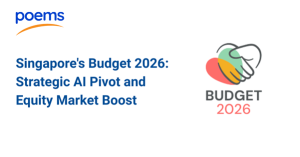Financial Literacy: Your Best Protection Against Scams and Bad Investments September 11, 2024

In recent years, the rise of robo-advisors and low-cost DIY trading platforms, often offering attractive sign-up promotions such as free shares and referral perks, has made it easier than ever for investors to access a wide range of financial instruments. These include stocks, ETFs, unit trusts, options, forex, commodities, CFDs, and more, all just a few clicks on mobile apps.
While these platforms have helped to democratise access to financial instruments for the average retail investor, eliminating the need for traditional brokers, the convenience of digital platforms has also increased the risk of making poor investment decisions driven by fear, greed, or misinformation. Worse still, it has opened the door to investment scams.
According to the Singapore Police Force1, scam victims in Singapore lost a total of S$651.8 million in 2023, with young adults being the most vulnerable. This figure is in addition to the losses from the collapse of cryptocurrencies like Luna and TerraUSD, as well as major cryptocurrency platforms such as FTX in 2022. The resulting ‘crypto winter’ wiped-out billions of dollars for investors, many of whom were young, first-time investors from the Millennial and Gen Z generations. Older investors may recall the infamous gold buyback schemes like The Gold Guarantee and Genneva Gold, between 2011 and 2015, which turned out to be elaborate Ponzi schemes.
Nowadays, questionable investment products are also being promoted on social media apps through targeted advertisements and sponsored posts, often marketed as ‘limited offers’ or ‘rare gems’ that promise high returns with low risk.
While seasoned investors may be able to do the math and see through the hype, the reality is that many investors in Singapore lack the fundamental knowledge needed to evaluate the risks of many financial products or to assess the reliability of online financial content.
In 2023, the Sustainable Investment Survey, jointly conducted by the Singapore Management University (SMU) and the Global Financial Literacy Excellence Centre 2, revealed that 60% of Singaporeans aged 23 to 86 were unable to correctly answer all of the ‘Big Three’ financial literacy questions, which focus on interest, inflation, and risk diversification. Without a solid grasp of these basic financial principles, it is unlikely that the average investor can effectively evaluate financial instruments or navigate the various finance contents online.
Given these considerations, I would argue that the best strategy to safeguard our own financial interests is to become more financially literate. Here are three practical tips on how you can improve your financial literacy and make more informed investment decisions:
#1 Attend Financial Literacy Courses
One of the best ways to enhance financial literacy is by actively seeking out financial educational programmes offered by reputable institutions or educational organisations.
Singaporeans aged 25 and above can utilise their SkillsFuture Credits to attend courses provided by independent organisations, covering a wide range of topics, from the principles of money management and budgeting, to investing and retirement planning.
Timeless financial concepts that everyone should aim to master include:
- Compound Interest
- Time Value of Money (TVM)
- Inflation and its effects on interest rates
- Types of Risks and Diversification
Beyond these basics, it’s essential to learn how to calculate the Internal Rate of Return (IRR) for different cash flows over time, using simple yet powerful Microsoft Excel formulas like ‘IRR’ and ‘XIRR’ (Extended Internal Rate of Return). Mastering these concepts, will equip you to evaluate the actual net-of-fee returns of any financial product offered by your financial advisers, bank relationship managers, insurance agents, or investment professionals.
#2 Stay Updated on Financial News
After learning the timeless concepts, staying informed on current finance-related news is crucial. Major events such as the annual Budget by the Ministry of Finance (MOF) as well as major announcements by the MAS, CPF Board, the US Federal Reserve, and updates on macroeconomics and geopolitics can significantly impact financial markets. Additionally, be vigilant about the ever-changing tactics used by scammers. With the rise of AI, scammers can now easily produce deepfake content promoting investment scams on various social media platforms.
Another option is to follow independent financial influencers, or ‘finfluencers’ who promote finance content globally. In recent years, movements such as the Financial Independence, Retire Early (FIRE) Movement from the US, and 1 Million by 65 (1M65) Movement in Singapore have gained prominence, offering valuable insights to help followers increase financial literacy.
However, it’s essential to critically assess the content for mathematical accuracy and objectivity. Many finfluencers rely on third-party compensation, which might introduce bias or conflicts of interest, even if posts are not explicitly sponsored.
Therefore, while consuming timely finance content, it is important to always cross-reference multiple sources before acting upon them for financial decisions.
#3 Seek Professional Advice from Licensed Finance Professionals
Once you’ve expanded your knowledge, you may also consider seeking professional advice from a licensed and well-trained finance professional. A skilled advisor can act as your personal trainer in financial literacy, offering unbiased, personalised guidance tailored to your specific financial goals, risk tolerance, and circumstances.
While many DIY investment platforms provide self-guided questionnaires to help clients choose the “best option”, these standardised questionnaires, limited by their template, often overlook the nuances of each client’s financial goals. In my experience, clients truly value the personalised guidance and support that professionals provide.
Even with the rise of AI, DIY platforms, and a wealth of online finance content, a well-trained, licensed finance professional still plays an important role in navigating the complexities and uncertainties of the financial markets.
CONCLUSION:
As Warren Buffet once famously said, “If you don’t understand it, don’t invest in it. If you can’t explain it simply, you don’t understand it well enough.” In finance, knowledge is power. Elevating our financial literacy empowers us to evaluate the quality of financial content that we consume, helping us avoid online scams, misleading advice, and poor investment products that may seem attractive but pose hidden risks. A trusted finance professional can be your strongest ally against scams, offering personalised guidance to steer you in the right direction.
Reference:
- [1] https://www.businesstimes.com.sg/singapore/scam-victims-singapore-lost-s6518-million-2023-record-high-cases
- [2] https://g53network.org/wp-content/uploads/2023/06/SCONTI_G53.pdf
Contributor:

Yee Shen Hao
Financial Services Manager
Phillip Securities Pte Ltd (A member of PhillipCapital)
https://bit.ly/shenhao
Disclaimer
These commentaries are intended for general circulation. It does not have regard to the specific investment objectives, financial situation and particular needs of any person who may receive this document. Accordingly, no warranty whatsoever is given and no liability whatsoever is accepted for any loss arising whether directly or indirectly as a result of any person acting based on this information. Opinions expressed in these commentaries are subject to change without notice. Investments are subject to investment risks including the possible loss of the principal amount invested. The value of the units and the income from them may fall as well as rise. Past performance figures as well as any projection or forecast used in these commentaries are not necessarily indicative of future or likely performance. Phillip Securities Pte Ltd (PSPL), its directors, connected persons or employees may from time to time have an interest in the financial instruments mentioned in these commentaries. Investors may wish to seek advice from a financial adviser before investing. In the event that investors choose not to seek advice from a financial adviser, they should consider whether the investment is suitable for them.
The information contained in these commentaries has been obtained from public sources which PSPL has no reason to believe are unreliable and any analysis, forecasts, projections, expectations and opinions (collectively the “Research”) contained in these commentaries are based on such information and are expressions of belief only. PSPL has not verified this information and no representation or warranty, express or implied, is made that such information or Research is accurate, complete or verified or should be relied upon as such. Any such information or Research contained in these commentaries are subject to change, and PSPL shall not have any responsibility to maintain the information or Research made available or to supply any corrections, updates or releases in connection therewith. In no event will PSPL be liable for any special, indirect, incidental or consequential damages which may be incurred from the use of the information or Research made available, even if it has been advised of the possibility of such damages. The companies and their employees mentioned in these commentaries cannot be held liable for any errors, inaccuracies and/or omissions howsoever caused. Any opinion or advice herein is made on a general basis and is subject to change without notice. The information provided in these commentaries may contain optimistic statements regarding future events or future financial performance of countries, markets or companies. You must make your own financial assessment of the relevance, accuracy and adequacy of the information provided in these commentaries.
Views and any strategies described in these commentaries may not be suitable for all investors. Opinions expressed herein may differ from the opinions expressed by other units of PSPL or its connected persons and associates. Any reference to or discussion of investment products or commodities in these commentaries is purely for illustrative purposes only and must not be construed as a recommendation, an offer or solicitation for the subscription, purchase or sale of the investment products or commodities mentioned.
About the author
Yee Shen Hao
Financial Services Manager
Shen Hao is a Financial Services Manager and a trainer for Financial Literacy courses for schools and working adults. He is a CFP holder and graduated from NUS with Honours (Distinction). He is also a trainer for The Wealth Stewards Group (TWSG), a team of Wealth Managers at PhillipCapital managing over $90 million of assets for more than 400 families and corporate clients. The team's mission is to help clients achieve their financial goals and the life that they envision by providing ethical, mathematical, and holistic portfolio advice. He looks forward to meeting like-minded individuals who share these ideals in helping clients to join his team in building a sustainable, ethical, and holistic financial advisory practice.

 Shopify Inc. Upgraded to Buy on Strong AI-Powered Growth Prospects
Shopify Inc. Upgraded to Buy on Strong AI-Powered Growth Prospects  Singapore Budget 2026 Signals Strategic AI Pivot, Equity Boost
Singapore Budget 2026 Signals Strategic AI Pivot, Equity Boost  DBS Group Holdings Ltd Upgraded to Accumulate Despite Earnings Decline
DBS Group Holdings Ltd Upgraded to Accumulate Despite Earnings Decline  Elite UK REIT Shows Strong Performance with Successful Lease Regearing
Elite UK REIT Shows Strong Performance with Successful Lease Regearing 






